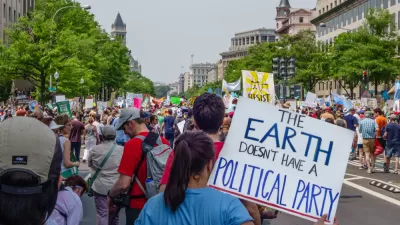Written by Wall Street Journal energy reporter Russell Gold, the new book offers three recommendations that should be acceptable to all parties, from fracking's strongest supporters to its most ardent opponents.
The three recommendations found in "The Boom: How Fracking Ignited the American Energy Revolution and Changed the World", were formulated after Gold spoke with "hundreds of engineers, executives, academics and environmentalists." The goal of the three measures is to make fracking "safer for people and the planet,"
Gold has written on many aspects of the energy industry, more than a few posted here. Some have an urban as well as energy perspective, such as his piece on Midland, Texas (and posted here).
- Fix the Leaks: Methane Leakage is so serious that some critics have said it makes it worse than burning coal from a greenhouse gas perspective. Others disagree. Good news: "It's a plumbing problem", states Hal Harvey, chief executive of Energy Innovations LLC, a policy and technology consultant.
- "If you want to argue that gas is part of the climate solution, you have to deal with methane leakage," says Harvey. The good news, he adds: "It's a plumbing problem. It's not thermodynamics." Making a power plant twice as efficient is difficult engineering; cutting methane leakage in half isn't. You just find the leaks and plug them."
- Get better data: "The Center for Sustainable Shale Development, a joint effort of major operators, environmental groups and foundations, says that it is critical to test groundwater before drilling begins and then for at least a year afterward."
- Build better wells: "Faulty cement doomed the Deepwater Horizon rig in the Gulf of Mexico and led to the death of 11 men and the worst offshore environmental disaster in U.S. history."
As much as some may oppose this type of oil drilling, "U.S. energy companies are drilling and fracking about 100 wells every day across much of the country," he writes. It has become embedded in our economy and is key to the nation's energy security. Notwithstanding serious methane leakage, it has been instrumental in reducing carbon dioxide emissions to 1992 levels.
So why not take the measures he recommends to make it safer for people and planet? You can access major book vending websites and read reviews from Gold's website on "The Boom".
FULL STORY: How to Make Fracking Safer

Alabama: Trump Terminates Settlements for Black Communities Harmed By Raw Sewage
Trump deemed the landmark civil rights agreement “illegal DEI and environmental justice policy.”

Study: Maui’s Plan to Convert Vacation Rentals to Long-Term Housing Could Cause Nearly $1 Billion Economic Loss
The plan would reduce visitor accommodation by 25% resulting in 1,900 jobs lost.

Planetizen Federal Action Tracker
A weekly monitor of how Trump’s orders and actions are impacting planners and planning in America.

This Toronto Suburb Has More Bus Riders Than Columbus, Ohio
Brampton, Ontario used gradual improvements in service to prove that if you build it, they will ride.

Paris Bike Boom Leads to Steep Drop in Air Pollution
The French city’s air quality has improved dramatically in the past 20 years, coinciding with a growth in cycling.

Why Housing Costs More to Build in California Than in Texas
Hard costs like labor and materials combined with ‘soft’ costs such as permitting make building in the San Francisco Bay Area almost three times as costly as in Texas cities.
Urban Design for Planners 1: Software Tools
This six-course series explores essential urban design concepts using open source software and equips planners with the tools they need to participate fully in the urban design process.
Planning for Universal Design
Learn the tools for implementing Universal Design in planning regulations.
Smith Gee Studio
Alamo Area Metropolitan Planning Organization
City of Santa Clarita
Institute for Housing and Urban Development Studies (IHS)
City of Grandview
Harvard GSD Executive Education
Toledo-Lucas County Plan Commissions
Salt Lake City
NYU Wagner Graduate School of Public Service




























